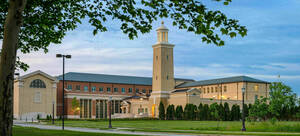Initiative for Adaptive Buildings and Cities: Beyond Modern Buildings
Pope Francis’ 2015 encyclical, Laudato si’, is a direct call to address the socioeconomic, urban, and environmental woes of our common home. It is a radical and urgent message to generate profound changes in both urban and rural lifestyles and modes of production and consumption. It calls for environmental stewardship through peaceful means. It demands an unprecedented discussion of avenues through which we may save our planet and ways in which we can ensure an acceptable quality of life for all, not just the rich and powerful nations that dominate global political and economic affairs.

The School of Architecture's Initiative for Adaptive Buildings and Cities is our answer to this call. During the spring 2024 semester, we are presenting five Faculty Roundtable discussions, led by Research Associate Carl Elefante.
Although the focus is on engaging School of Architecture faculty, the Roundtable sessions are open to all. Participation by students, faculty from other programs, and other interested parties is not only welcomed but encouraged.
All sessions are recorded and can be viewed here.
- The first session, Interlocking Imperatives, introduces the framework for addressing the challenges of 21st century habitation in the context of the climate, justice, and urban imperatives. (This session was held on January 24.)
- The second session, Reforming Cities and Towns, and the third session, Beyond Modern Buildings, investigate two scales of intervention, urban and building, to overcome the barriers to progress embedded in modern-era biases. (The second session was held on Februrary 14, and the third session is scheduled for March 5.)
- The fourth session, Prioritizing Regional Design, and fifth session, Prioritizing Re-Use, focus on two specific building sector issues critical in addressing the real-world challenges our profession will face during the careers of our students. (The fourth session is scheduled for March 27, and the fifth session is scheduled for April 2.)
Session 3
Long accepted modern-era building forms and construction practices were formulated during a time when social and environmental consequences were swept aside. In the nine thousand years of building history, such modern-era buildings and cities are in fact an anomaly, a brief period of fossil fuel addiction that must be retooled quickly and comprehensibly. Further, accepted notions of sustainable development and actions to curtail climate change in fact perpetuate the same modern-era biases which are incapable of producing rapid systemic change.
Building principles and practices which are fundamentally beyond those of the modern-era are urgently needed. As an architecture program dedicated to teaching traditional knowledge, we are called upon to help envision the design principles and construction practices beyond the modern era.
Pre-Recorded Guest Presentations
- Historic Perspective – David Fixler, Lecturer, Harvard University – The anomaly of modernism.
- Health Perspective – Liz York, Healthy Buildings, US GSA – Reconnecting with human health and wellbeing in the built environment.
Sponsored by the School of Architecture